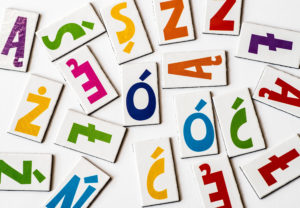You Can Learn Polish Easily
First off, let me just say that no language is “hard to learn”. No language is impossible to master. With the right resources and motivation, you can definitely reach fluency in Polish fast and easily. But, how hard it is to learn a language depends a lot on how close it is to your native language. So, here’s an honest review of how hard it is to learn Polish for English speakers.
How Long Does It Take to Learn Polish?
How long it takes to learn a language and how hard the language is are two very similar questions. The harder a language is, the longer it takes. That’s why the US Foreign Service Institute (FSI) first ranked the languages based on difficulty and then assigned a number for how long it usually takes.
For those of you who wonder how long it takes to learn Polish, the FSI offers these numbers: Polish is a Category 4 language. Which means that it takes around 44 weeks or 1100 hours of study to master it. Now, please take these numbers with a grain of salt. No official estimate can account for how motivated you are, and what resources you’re using.
You can always learn Polish faster with the right resources.
3 Reasons Why Polish is Hard to Learn
Although every language learner finds different aspects of Polish more difficult than others, these features of the language are generally considered harder. But, that doesn’t mean that you will. Perhaps you’ll cruise through them much more easily than others. The right language learning methods will certainly help you with that.
1. Polish Pronunciation is Hard
One look at the word “bezwzględny” makes any learner cringe. Trying to pronounce this beast is a challenge for all. And the fact that it means “ruthless” seems oddly appropriate as well.
Consonant clusters are very common in the Polish language. And pronouncing them seems very tricky. But, pronouncing individual letters can seem like a challenge too. Letters like ‘sz’, ‘ś’, ‘ź’, and ‘dż’ are very common, and mastering the difference between them takes time.
But, take this under consideration. Learning English pronunciation isn’t harder than Polish. Mastering the “th” sound for example is very difficult for foreigners. So, you’ve already done it once. Nothing’s stopping you from mastering Polish pronunciation. With a little bit of practice, you won’t even think these sounds are difficult at all.

2. Polish Has Three Genders
This one’s a hard pill to swallow for learners. But, even though the concept of grammatical genders is foreign to English speakers, it’s actually quite common. German also has three genders. Spanish and French for example both have two.
The three Polish genders are masculine, feminine, and neuter.
To make things a little better, differentiation Polish genders is extremely easy. Feminine nouns usually end in “-a”, and neuter ones end in “-o”. Everything else is usually masculine. Polish also doesn’t have any articles, so you don’t have to worry about the different gendered articles like in German.
3. There Are Seven Cases in Polish
Grammatical cases signal what role a word fulfills in a sentence. Usually, languages only have four grammatical cases: nominative (when the word is the subject), accusative (when the word is the direct object), dative (when the word is the indirect object), and genitive (when the word is possessive).
But Polish grammatical cases are on steroids. You have seven different cases for nouns, pronouns, and adjectives in Polish grammar. Apart from the three previously listed cases, they also have instrumental, locative, and vocative cases.
This means that there are 7 different ways you can conjugate a Polish word. While it’s not impossible to master, it does make learning Polish grammar just a little bit more difficult.
Why Polish is Easier to Learn
Of course, there are parts of Polish which make it easier to learn than others. Although this is not an exhaustive list, these are the top reasons why learning Polish isn’t as complicated as they say.
1. Polish Is Phonetic
While one of the reasons that Polish is hard to learn was the pronunciation, there are a couple of reasons that make it easier. Polish is phonetic. So, when you learn the Polish alphabet, you know it for life. You won’t ever have to question how a letter is pronounced. It will be the same every time.
Polish intonation is also easy to master. You stress the second-to-last syllable every time. You see, it’s not complicated at all.
2. Polish Verbs Have Fewer Tenses
There are so many ways to say the past tense in English. For example, if you went for a run, you can say “I ran”, “I have run”, “I have been running”. But, in Polish, all three of these is covered by “biegałem”. So, learning Polish verbs doesn’t take a long time.

3. The Vocabulary Will Be Familiar in Polish
Although Polish is a Slavic language, a lot of its words have Latin roots. So, you’ll recognize words like “artysta” (artist), “woda” (water), “kolor (color), and “grupa” (group). This will make enhancing your Polish vocabulary much easier.
4. Polish Sentence Structure is Flexible
Word order doesn’t matter in Polish. In English, “Mary eats an apple” makes sense, and “Mary an apple eat” doesn’t. But, Polish is much more flexible. Here’s a quick translation of the previous example to show you how you can still have the same meaning with different word order in Polish.
- Mary je jabłko. – Mary eats an apple. (Literally: Mary eats apple.)
- Mary jabłko je. – Mary eats an apple. (Literally: Mary apple eats.)
Is Polish Worth Learning?
So, knowing all of these difficulties, is learning Polish even worth it? The answer is: absolutely. There are a lot of reasons to learn Polish. You can speak to 40 million people, access other Slavic languages, and boost your mental health by learning Polish.
But, Polish isn’t difficult to learn overall. Well, even if it was it would be worth it. But, the truth is, it’s a relatively simple language to learn. By using the best resources, you can certainly make your Polish studies much more easy and effective.
Learn Polish Easily with an App
And the best resource to learn Polish is OptiLingo. Guaranteed. This app can get you to Polish fluency much faster than any other. By giving you the most common Polish words and phrases, it teaches you exactly like the locals speak.
Plus, this method also cuts down on time. By learning only the most essential expressions, you never learn unnecessary Polish vocabulary. But, you still reach fluency. Best of all, OptiLingo also makes you speak the language. You’ll build your Polish confidence easily. And pronouncing those pesky Polish words will be much easier once you practice them.
So, really, learning Polish doesn’t have to be hard at all. Achieve Polish success fast and effectively when you download OptiLingo!







